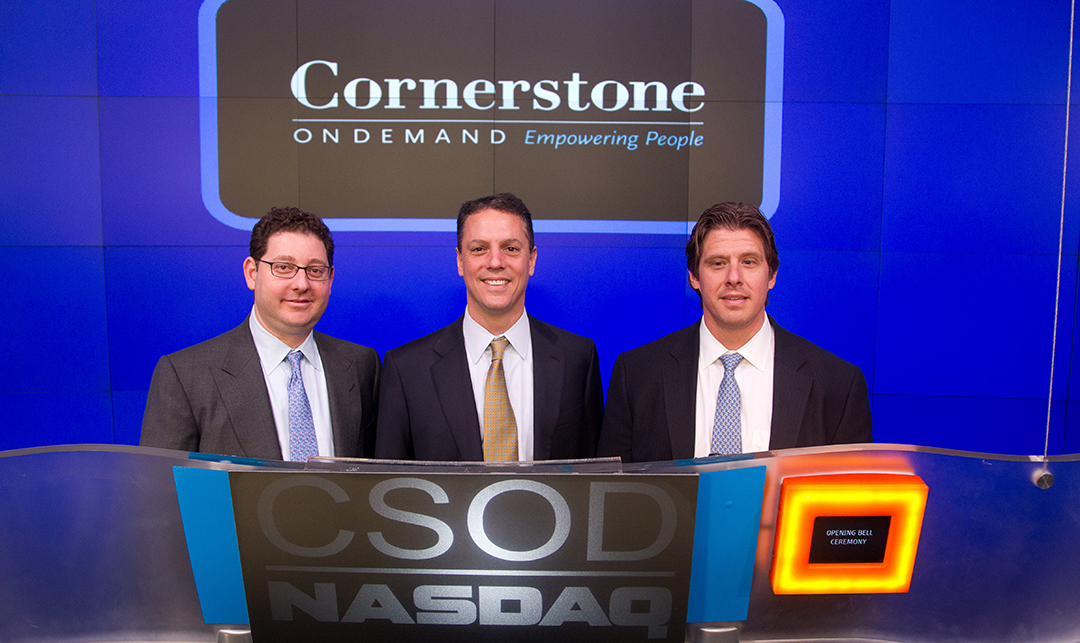Since Cornerstone OnDemand (NASDAQ: CSOD) went public in 2011, its corporate headquarters have grown from one to three full floors at the lush Water Garden multi-tower business park in Santa Monica. If this expansion correlates with the company’s scalability, it seems inevitable that Cornerstone will one day occupy its own tower at the complex.
It is that level of growth (58 percent per year for eight straight years) that required President & CEO Adam Miller break his penchant for micromanaging his staff. Miller’s shift from micro-manager to leader progressed as he developed solid coaching and advising skills, empowering his team to do their jobs. “My mentors were the people I worked with, and we sort of figured it out together,” he says. “The needs of a leader in a company like this change over time – they’re not static.” Ultimately, Miller learned that surviving – and thriving – on any professional level could be boiled down to two basic questions: “Are you coachable?” and “Are you willing to change?”
Miller’s vision for Cornerstone started to take shape in 1994 during a business competition while he was pursuing his MBA at UCLA. His friend tried to persuade him to drop out of school to pursue the venture, but Miller didn’t feel the timing was right and instead finished his MBA. His prudence paid off. What was originally to be an interactive CD-ROM company shifted to the Web when Miller realized that it was the distribution model––not content creation––that would be the better avenue to commoditize and scale a business.
In 1999, Miller, Perry Wallack, and Steven Seymour founded Cornerstone OnDemand, providing cloud-based applications that recruit, train, manage, and connect people across any organization, large or small. On March 17, 2011 – St. Patrick’s Day, as Miller vividly recalls with a laugh – Cornerstone announced its IPO. Today the company employs 1,200 people in 13 locations around the globe, and Miller projects revenue for 2014 to hit $262 million, up from $185 million in 2013.
The founding trio’s collective talents have meshed well over the years. Miller filled the role of de facto leader and public face, Wallack (chief financial officer) was concerned with cost efficiencies and keeping the company in business, and Seymour (VP of strategic accounts) was focused on driving revenue and growth. Miller would act as arbiter when the two differed, a skill he perfected during his time in law school.

In the rear, the Water Garden, comprised of six 6-story glass towers and two 5-story glass towers totaling 1.27 million square feet.
Born Under a Bad Sign
Miller openly acknowledges the challenges that have defined Cornerstone’s history leading up to and including the company’s IPO. Some of the biggest failures concerned an inability to raise capital, which Miller notes almost took the company out of business many times. To borrow the lyric from an old blues song, if it wasn’t for bad luck, Cornerstone wouldn’t have had any luck at all.
For starters, the company launched in 1999, right before the tech bubble burst. Then, they built up their initial investment pipeline in New York right before 9/11 hit. They almost ran out of capital during the recession in the mid-2000s and didn’t take a preemptive bid for a second round of venture capital right before Lehman Brothers folded in September 2008. They went public the same week the devastating earthquake / tsunami and resulting nuclear fallout hit Japan. And they planned a secondary offering just before the U.S. treasury got downgraded, in August 2011. Even with these failures, Miller says he believes that everything has happened for a reason, and those setbacks kept the company nimble and focused on a sustainable growth model.
“Very early in the business – probably too early, to be candid – I was worried about managing growth,” admits Miller. That perspective matured organically over time. “The key for us was always having multiple vectors of growth, continuously looking for other market opportunities,” he says. “You need to make investments far in advance to be able to have any scale by the time you need them.” In addition to proactivity, he points out, you must manage what is in front of you. The key to continuous growth is “constantly planting new initiatives, cultivating existing initiatives, and harvesting the more mature initiatives, all at the same time,” says Miller. “It’s about being adaptable over time and being adaptable within time.”
To ensure that other startups have a faster and less painful learning curve (notwithstanding natural disasters), the company created Cornerstone Accelerator. The accelerator serves two purposes: to help build up the LA eco-system around tech and to allow Cornerstone to keep its finger on the pulse of the tech world. The accelerator serves companies that are in between an incubator and their first financial raise. These companies get an enormous amount of value by working within an organization such as Cornerstone, which offers strategic support and advice, in addition to office space. Miller’s goal is to ensure they retain the entrepreneurial spirit that has lead them to their current success at all times.
Scaling Up (but not upscale)
Cornerstone’s headquarters is the epitome of sleek yet comfortable and inviting workspace: Dispersed among open office areas are Ping-Pong tables, a domed movie theater, and glass-encased conference rooms. Have a bright idea while you’re walking down the hall? Jot it on the wall – almost every surface is whiteboard writeable. Technology is infused in every part of the campus experience, from the digital tablet check-in to the dozens of employees buzzing around, nose down in their smart phones. Walking from floor to floor, it is clear that this company’s growth has been fast and global as exemplified by the construction trussing and the many conference rooms each named after one of the countries in which Cornerstone has a presence.
“Things break when they’re growing that quickly … People need to evolve, or they don’t fit anymore. [They] need to be able to scale, just like the business needs to scale.”
Scalability is coveted within the tech world. Everyone knows they want it, but very few know how to get it. Most startups in the technology space only know that it’s the key to big investment dollars and even bigger exits. Miller strongly believes this failure to scale is a direct result of the lack of discipline retained by startups that go after large funding rounds too soon without understanding business fundamentals. Many VC-backed companies assume they will always have a tremendous amount of cash and therefore develop bad habits. Miller’s suggestion for startups? “Run the business to at least some significant milestone with as limited capital as possible, typically with friends and family money, before you go out for VC funding. You will end up with better control of the company and more equity, and likely with a better venture partner.”
Miller gained a keen understanding of scalability early in his career during his time as an investment banker. He was tasked with an internal project to look at the business and analyze what challenges the company would face in the upcoming years. His group’s recommendations went unheeded, and the company failed a few years later. “I learned during that process that this is something you’ve got to pay attention to.”
At the Summit
The exponential growth Cornerstone has enjoyed is hard to fathom until you realize that the client base is more than doubling every two years and within three or four years it’s quintupling. “Things break when they’re growing that quickly,” cautions Miller. “People need to evolve, or they don’t fit anymore. [They] need to be able to scale, just like the business needs to scale.”
Miller is an archetypal example of an empowered CEO and community leader. His dedication to improving the technology space, social responsibility, and global economy is what sets him apart and keeps him aligned with his principal vision; to develop a sustainable business model for Cornerstone while having a positive social impact.
What’s next for Cornerstone after cornering their market is to develop ways to keep current in the technology space while at the same time, doing social good. Between Miller and his wife, they sit on six different boards of directors. Miller notes this is partially to bring balance to a chaotic business and personal life where he is also co-CEO of three young children, 5, 7 and 9, but also because it helps him and his wife realize that no matter how busy they are, they always have time to give back. Miller uses the metaphor of playing soccer and something his coach u
sed to tell him, “When you cross that line, when you’re on the field, you have 90 minutes to think about nothing else. When you get off the field, you can go back to worrying about whatever it is you’re concerned about, but when you’re on the field, you focus on the game.” Miller takes that attitude into his daily life both personally and at work.

Miller delivering his keynote address at Cornerstone OnDemand’s 12th annual Convergence event held in San Diego, CA
Cornerstone’s social good expands far beyond the Miller family’s commitment to serving on boards. In 2010, Cornerstone developed a foundation arm. The Cornerstone Foundation is the realization of the core beliefs of Miller and his partners that the company would never be “just about making money.” They were clear that improving access to education and giving back are integral to their basic values. Although it took them years to build the capital to do so, the foundation currently supports some of the largest nonprofit organizations in the world with a focus on education, workforce development, and disaster relief; all areas where Cornerstone can best leverage their resources. Cornerstone provides these nonprofits with free training and free consulting through their HR program, and allows them to utilize the Cornerstone software technology. One of Cornerstone’s goals was to help 30,000 humanitarian aid workers, which they have exceeded; and they are just getting started.
Looking to shine a spotlight on the exceptional wealth of tech talent in Los Angeles, Cornerstone OnDemand founded LA Tech Summit in 2013. The event was a smash success, and, in a prime example of scalability, the 2014 Summit, held in December at JW Marriott at L.A. Live attracted a huge roster of notable influencers. Speakers included LA Mayor Eric Garcetti, Gil Elbaz (Factual), Dana Settle (Greycroft Partners), Mark Suster (Upfront Ventures), Frank Quattrone (Qatalyst Partners), and Scott Painter (TrueCar). Miller may have to relinquish the reins if the Summit continues its upward trajectory. Miller’s accomplishments, from growing Cornerstone to IPO, to building the foundation, to the incubator and the summit, are all aligned with the company’s larger vision and what they believe to be their civic responsibility. By building a ubiquitous technology and applying it in a meaningful way across multiple verticals, Miller continues to build a company that will leave a unique legacy of helping not only Los Angeles, but also the world.














































